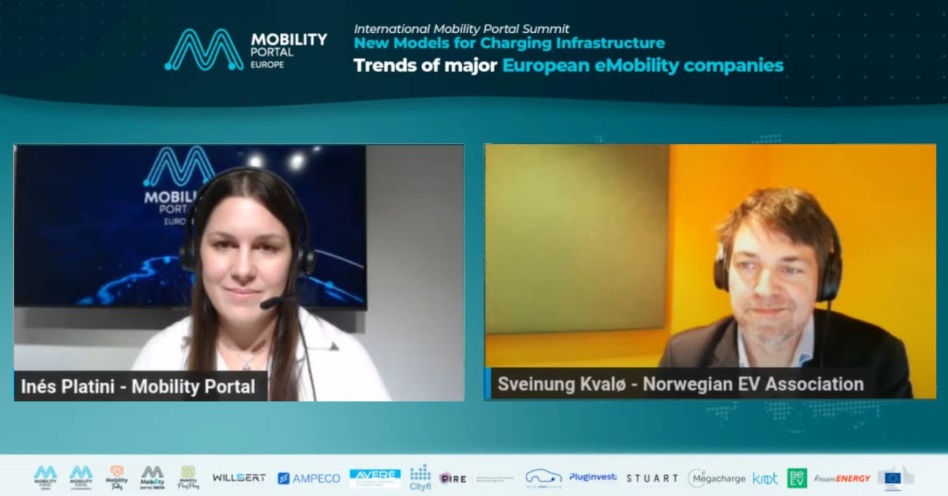Norway has clear rules: it will aim for new passenger cars to be completely emissions-free by 2025. There are only nine months left.
“Our goal is to electrify all the transport as fast as possible for the benefit of the environment. We are working on it,” says Sveinung André Kvalø, Senior Advisor at the Norwegian EV Association (Norsk elbilforening), during the International Mobility Portal Summit, organized by Mobility Portal Europe.
While the transition in the country is progressing well, there are still some challenges to be addressed.
In this regard, the association is working on policies to achieve the objectives for the coming year.
“To do this, we need to change the tax rules for leasing companies. In 2020, we wrote a report and now there is a public hearing in which we are participating,” Kvalø explains.
In the public hearing, the Ministry of Finance proposes to change these tax rules.
However, Kvalø warns: “They have faced opposition from these companies. But we really need to look into all the details of how these issues are regulated.”
The truth is that, while in the first half of 2023, 94.3 per cent of private drivers chose an electric car, the situation in the leasing and company vehicle market was completely different: the proportion of these units only reached 66.9 per cent.
This means that there are too many new polluting cars going to rental and leasing companies.
If this situation continues, Norway may struggle to achieve the Storting’s goal that all new cars by 2025 be electric.
But this is not the only challenge the country faces.
The exemption from Value Added Tax (VAT) has been decisive in ensuring that Norway has a significant number of zero-emission units in its vehicle fleet.
But this measure is being called into question.

It is worth remembering that from 2000 to 2023, electric cars were exempt from this tax, whereas today it applies to units costing more than 500,000 euros, in other words, a maximum VAT.
The current regime was approved until 2024 by the ESA, the monitoring body of the EEA agreement.
Therefore, to continue investing in zero-emission units, the country must submit a new request to the ESA for the years 2025-2026.
But, without a “clear signal” to continue with this regime, consumers may risk facing a “fiscal bomb” that could suddenly increase the cost of all electric cars by 125,000 Norwegian kroner overnight, as explained by Christina Bu, Secretary General of Norsk elbilforening.
Charging infrastructure: No range anxiety, but difficulty with payments
According to Kvalø, 80 per cent of electric car charging takes place at home or nearby locations.
However, he acknowledges that fast charging “is also important” to encourage people to opt for zero-emission units.
Currently, Norway has 7,900 fast charging devices and a commercial network spread throughout the territory.
“We had an initial subsidy program, which was small-scale and finished by 2017, when only five per cent of cars were fully electric,” comments the Senior Advisor.
And he continues: “Then, most fast chargers have been built by private companies.”
These initiatives allowed the country to have a “robust” market and “range anxiety disappeared“.
However, some users experience problems related to payment solutions.
To remedy this, it was established that by the end of 2025, all fast chargers (new and old) in Norway must have the option of card payment.
“We have been pushing for it for many years, and we are happy to see that it is now a mandatory requirement,” celebrates Kvalø.
“It is important that when the user is on the road, they do not have to register over and over again, and waste time,” he adds.
Finally, as a positive aspect, the Senior Advisor mentions that the charging sector is “really feasible” and “a completely viable market”.
“We have spent much more on supporting the purchase of cars than on charging infrastructure, and the pace of new chargers is higher than ever, even without subsidies,” he emphasizes.
8th edition of the Nordic EV Summit
With over 120,000 members, the association has been actively promoting the electrification of the transportation sector for over 25 years, contributing to making Norway the global leader in zero-emission vehicles today.
This year, on the 4th and 5th of April in Oslo, the eighth edition of the Nordic EV Summit will take place, serving as a significant networking forum for global stakeholders.
Recognised as one of the most important venues for the electric mobility industry in Europe, the summit brings together policymakers, industry leaders, researchers, and organizations to connect and discuss how to electrify the transportation sector as quickly as possible.
It is an international conference with participants from around the world, currently boasting 45 speakers from 17 different countries.
This year, Mobility Portal Europe will be participating in the event to provide coverage.
Below, the participation of Sveinung André Kvalø during the International Mobility Portal Summit:








